Birmingham Museums Trust facts for kids
| Formation | 2012 |
|---|---|
| Type | Charitable trust |
| Purpose | Museum management |
| Location | |
|
Director
|
Sara Wajid and Zak Mensah |
|
Chair
|
Niels De Vos |
|
Parent organization
|
Birmingham City Council |
|
Staff
|
153 |
| Website |
The Birmingham Museums Trust is a special group that manages nine amazing museums and historic places across the city of Birmingham in the United Kingdom. It's the biggest independent group of museums in the country! More than 1.1 million people visit these sites every year.
Some of the most famous places they look after include the Birmingham Museum and Art Gallery (BMAG) and Thinktank, Birmingham Science Museum.
The Trust started in April 2012. It was formed when the Birmingham Museums and Art Gallery, which belonged to the Birmingham City Council, joined with the Thinktank charitable trust. Even though the Trust manages them, the buildings and the collections inside still belong to the City Council. The Council also decides if visitors need to pay to get in. For example, it's free to visit BMAG, but there's a charge to enter Thinktank.
Besides the main museum and art gallery, the Trust also manages other cool places. These include the Birmingham Museum Collection Centre and historic homes like Aston Hall, Blakesley Hall, and Soho House. They also run Sarehole Mill, the Museum of the Jewellery Quarter, and Weoley Castle. Thinktank was created using the science and industry items that the City Council used to own.
In January 2012, the new Trust announced that it had received funding from the Arts Council for three years. This helped them get started.
Amazing Collections to Explore
The Birmingham Museums Trust has a huge and varied collection of items. These include many beautiful paintings, sculptures, and other artworks. But it's not just art!
You can also find:
- Old steam engines, including the oldest working engine in the world.
- Cool aeroplanes.
- Classic cars from famous British brands like Austin, Rover, and MG.
- A classic red phone box.
- Many different coins.
- A unique electric vehicle called a Sinclair C5.
Birds and Natural History
The natural history collection is also very impressive. It has about 5,700 stuffed animal specimens, mostly birds. It also includes skins, bones, eggs, and nests. Many of these items came from private collections of famous bird experts.
You can even see taxidermied specimens of birds that are now extinct, like the great auk and the passenger pigeon. The museum also holds fifty of the special "Hastings Rarities" bird specimens.
Places to Visit
The Birmingham Museums Trust manages several fantastic locations across the city. Each one offers a unique experience!
| Photo | Name | What You'll Find |
|---|---|---|
 |
Aston Hall | A grand old house built between 1618 and 1635, located in Aston. |
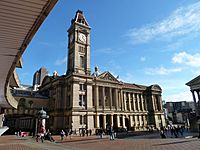 |
Birmingham Museum and Art Gallery | The main museum and art gallery in the city centre. |
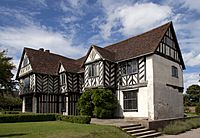 |
Blakesley Hall | A beautiful Tudor house located in Yardley. |
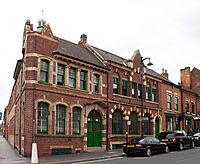 |
Museum of the Jewellery Quarter | Located in Hockley, this museum shows how jewellery was made. |
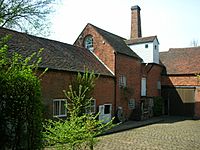 |
Sarehole Mill | A historic water mill located in Hall Green. |
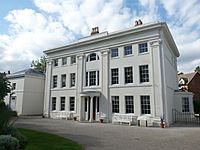 |
Soho House | Located in Handsworth, this was the home of Matthew Boulton. It has exhibits about the Lunar Society. |
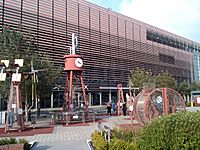 |
Thinktank, Birmingham Science Museum | A fun science and industry museum with lots of interactive exhibits. |
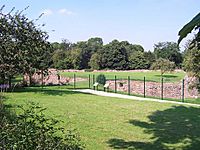 |
Weoley Castle | The ruins of an old castle, which gives its name to the surrounding Weoley Castle district. |
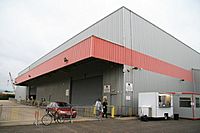 |
Birmingham Museum Collection Centre | Located in Nechells, this huge centre stores 80% of the Trust's collections. It's open to the public on special days or by appointment. |

